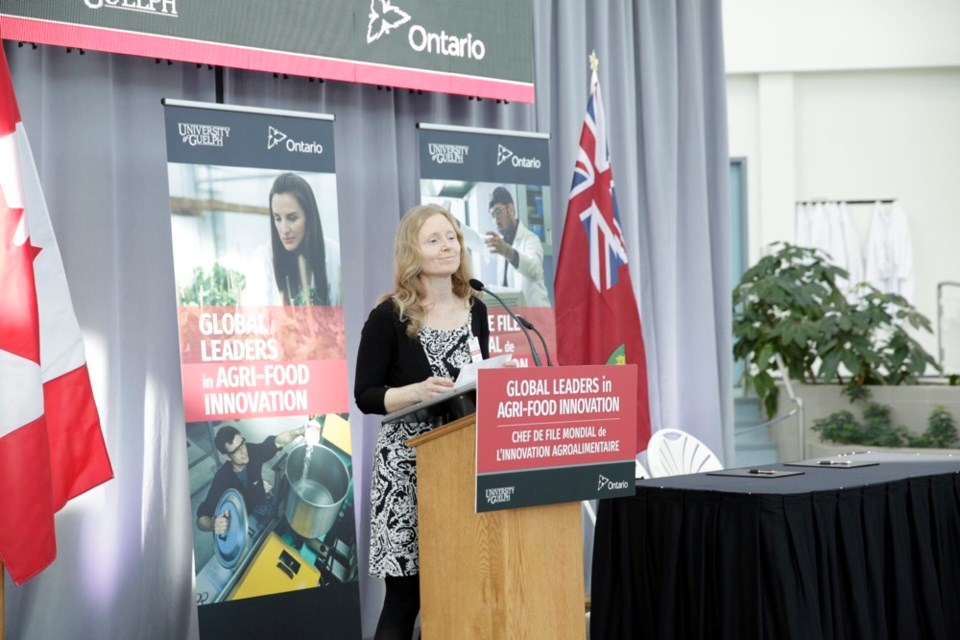University of Guelph President Franco Vaccarino gave a thumbs-up last Tuesday as, on behalf of the institution, he put pen to paper to receive the $713-million, 10-year investment from the Ontario Ministry of Agriculture, Food and Rural Affairs, to renew and further build the long-standing partnership between the university and the ministry.
That kind of commitment would be a confidence booster and game changer for any university and its hometown.
For the University of Guelph, it makes the university what Vaccarino describes as the “epicentre of agricultural research and innovation for all of Canada.” It leaves no doubt the university is indeed Canada’s food university.
At the same time, it helps Guelph grow either directly or indirectly, through employment and investment. Some of the innovations that come out of labs and fields supported through the partnership turn into local businesses and jobs. In fact, a dozen active companies have already spun-off from University of Guelph research supported by the partnership.
And it’s good for the province. The partnership sustains collaboration between the ministry and the university – to provide safe food, grow Ontario's capacity to produce food, support a globally and domestically competitive agri-food sector, and protect animal, plant and public health and the environment.
It provides the kind of foundation, infrastructure and critical mass of experts who are equipped to address challenges staring us in the face, like how to feed a growing population. But other hidden challenges are addressed too thanks to partnership support, for testing in the Animal Health Laboratory and Agri-Food Laboratory, helping keep food and livestock safe, and staving off problems that are imminent, percolating and mostly unknown to the public.
For example, look at what’s going on in the city’s industrial park. There, a company called Mirexus, created following the discovery of a unique corn-based chemical called PhytoSpherix in University of Guelph physics professor John Dutcher’s lab, has turned into a leading-edge international business. Construction is underway in the industrial park for a headquarters, laboratory and manufacturing facility. Ultimately, more than 70 jobs will be created.
Part of the research that went into helping advance PhytoSpherix came from the University of Guelph - Ontario Ministry of Agriculture, Food and Rural Affairs partnership.
And look at the Guelph-based animal genetics company called Semex. It’s commercialized something called high-immune response (HIR) technology developed at the university in immuno-genetics professor Bonnie Mallard’s lab, that singles out exceptional cows with better, natural disease immunity. That reduces the need for antibiotics, saving farmers millions of dollars a year, and leads to a safer food system.
It’s caught on globally. Semex, a Guelph-based animal genetics company, has already sold $100 million worth of HIR genetics, called Immunity+, in 80 countries. The University of Guelph - Ontario Ministry of Agriculture, Food and Rural Affairs partnership helped HIR technology reach the commercial stage.
And finally, among many other things, the partnership is also directly helping Guelph families, through the landmark Guelph Family Health Study. It’s an extensive 20-year research project that has already involved hundreds of people in the Guelph area. By the age of five or six, kids will form eating, exercise and sleep habits that can last a lifetime. This study is testing new ways for kids to learn healthy habits early – habits that can significantly lower your child’s risk for disease now and in the future.
University of Guelph students benefit from the partnership’s high-quality personnel development, and by being part of the agri-food research process itself. At last week’s partnership renewal announcement, human health and nutritional sciences professor Alison Duncan noted the connection the partnership fosters among agriculture, food and human health… and how students fit into the mix.
“The entire process builds capacity in everyone involved, particularly students who through experiential learning opportunities grow to understand the strong results of collaborative effort,” she said. “The students graduate, get jobs and contribute their expertise to building up the agri-food sector in Ontario.”
The $713 million investment is going into an institution that already has a proven track record. It’s not starting from scratch, it’s not a late entry into agri-food sector. Rather, in some shape or form, the university and province have cooperated on agriculture and food research for 125 years.
In fact, many of the crops grown by Ontario farmers started with germplasm created from research at the university, supported by the ministry. The same goes for advances in livestock production and veterinary medicine and science. And healthy food, developed through research studies, is an imperative that goes back to the Macdonald Institute, one of the university’s founding colleges, established in 1903.
Says Hon. Jeff Leal, the province’s minister of agriculture, food and rural affairs, “By 2050, there’ll be nine billion people in the world to feed, and Canada and Ontario have been called on to meet that challenge. The only way you can meet that challenge is to continue to drive research and innovation, and the University of Guelph will play that pivotal role."
